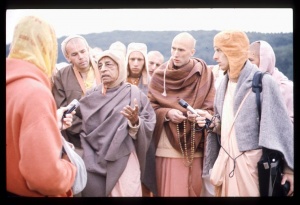SB 3.5.9: Difference between revisions
m (1 revision(s)) |
No edit summary |
||
| Line 1: | Line 1: | ||
{{info | {{info | ||
|speaker=Vidura | |speaker=Vidura | ||
|listener=Maitreya | |listener=Maitreya Ṛṣi | ||
}} | }} | ||
[[Category:Srimad-Bhagavatam - Canto 03 Chapter 05|S09]] | |||
[[Category:Bhagavatam Verses Spoken by Vidura - Vanisource|030509]] | |||
<div style="float:left">'''[[Srimad-Bhagavatam]] - [[SB 3|Third Canto]] - [[SB 3.5: Vidura's Talks with Maitreya|Chapter 5: Vidura's Talks with Maitreya]]'''</div> | |||
<div style="float:right">[[File:Go-previous.png|link=SB 3.5.8]] '''[[SB 3.5.8]] - [[SB 3.5.10]]''' [[File:Go-next.png|link=SB 3.5.10]]</div> | |||
{{RandomImage}} | |||
==== TEXT 9 ==== | ==== TEXT 9 ==== | ||
<div | <div class="verse"> | ||
yena prajānām uta ātma-karma- | :yena prajānām uta ātma-karma- | ||
rūpābhidhānāṁ ca bhidāṁ vyadhatta | :rūpābhidhānāṁ ca bhidāṁ vyadhatta | ||
nārāyaṇo viśvasṛg ātma-yonir | :nārāyaṇo viśvasṛg ātma-yonir | ||
etac ca no varṇaya vipra-varya | :etac ca no varṇaya vipra-varya | ||
</div> | </div> | ||
| Line 16: | Line 22: | ||
==== SYNONYMS ==== | ==== SYNONYMS ==== | ||
<div | <div class="synonyms"> | ||
''yena''—by which; ''prajānām''—of those who are born; ''uta''—as also; ''ātma-karma''—destined engagement; ''rūpa''—form and feature; ''abhidhānām''—endeavors; ''ca''—also; ''bhidām''—differentiation; ''vyadhatta''—dispersed; ''nārāyaṇaḥ''—the Supreme Personality of Godhead; ''viśvasṛk''—the creator of the universe; ''ātma-yoniḥ''—self-sufficient; ''etat''—all these; ''ca''—also; ''naḥ''—unto us; ''varṇaya''—describe; ''vipra-varya''—O chief amongst the ''brāhmaṇas''. | |||
</div> | </div> | ||
| Line 23: | Line 29: | ||
==== TRANSLATION ==== | ==== TRANSLATION ==== | ||
<div | <div class="translation"> | ||
O chief amongst the brāhmaṇas, please also describe how Nārāyaṇa, the creator of the universe and the self-sufficient Lord, has differently created the natures, activities, forms, features and names of the different living creatures. | O chief amongst the brāhmaṇas, please also describe how Nārāyaṇa, the creator of the universe and the self-sufficient Lord, has differently created the natures, activities, forms, features and names of the different living creatures. | ||
</div> | </div> | ||
| Line 30: | Line 36: | ||
==== PURPORT ==== | ==== PURPORT ==== | ||
<div | <div class="purport"> | ||
Every living being is under the plan of his natural inclinations in terms of the modes of material nature. His work is manifested in terms of the nature of the three modes, his form and bodily features are designed according to his work, and his name is designated according to his bodily features. For example, the higher classes of men are white (śukla), and the lower classes of men are black. This division of white and black is in terms of one's white and black duties of life. Pious acts lead one to take birth in a good and highly placed family, to become rich, to become learned, and to acquire beautiful bodily features. Impious acts lead one to become poor by parentage, to be always in want, to become a fool or illiterate and to acquire ugly bodily features. Vidura requested Maitreya to explain these differences between all the living creatures made by Nārāyaṇa, the Supreme Personality of Godhead. | Every living being is under the plan of his natural inclinations in terms of the modes of material nature. His work is manifested in terms of the nature of the three modes, his form and bodily features are designed according to his work, and his name is designated according to his bodily features. For example, the higher classes of men are white (''śukla''), and the lower classes of men are black. This division of white and black is in terms of one's white and black duties of life. Pious acts lead one to take birth in a good and highly placed family, to become rich, to become learned, and to acquire beautiful bodily features. Impious acts lead one to become poor by parentage, to be always in want, to become a fool or illiterate and to acquire ugly bodily features. Vidura requested Maitreya to explain these differences between all the living creatures made by Nārāyaṇa, the Supreme Personality of Godhead. | ||
</div> | </div> | ||
__NOTOC__ | |||
<div style="float:right; clear:both;">[[File:Go-previous.png|link=SB 3.5.8]] '''[[SB 3.5.8]] - [[SB 3.5.10]]''' [[File:Go-next.png|link=SB 3.5.10]]</div> | |||
__NOTOC__ | |||
__NOEDITSECTION__ | |||
Revision as of 02:35, 4 May 2021

A.C. Bhaktivedanta Swami Prabhupada
TEXT 9
- yena prajānām uta ātma-karma-
- rūpābhidhānāṁ ca bhidāṁ vyadhatta
- nārāyaṇo viśvasṛg ātma-yonir
- etac ca no varṇaya vipra-varya
SYNONYMS
yena—by which; prajānām—of those who are born; uta—as also; ātma-karma—destined engagement; rūpa—form and feature; abhidhānām—endeavors; ca—also; bhidām—differentiation; vyadhatta—dispersed; nārāyaṇaḥ—the Supreme Personality of Godhead; viśvasṛk—the creator of the universe; ātma-yoniḥ—self-sufficient; etat—all these; ca—also; naḥ—unto us; varṇaya—describe; vipra-varya—O chief amongst the brāhmaṇas.
TRANSLATION
O chief amongst the brāhmaṇas, please also describe how Nārāyaṇa, the creator of the universe and the self-sufficient Lord, has differently created the natures, activities, forms, features and names of the different living creatures.
PURPORT
Every living being is under the plan of his natural inclinations in terms of the modes of material nature. His work is manifested in terms of the nature of the three modes, his form and bodily features are designed according to his work, and his name is designated according to his bodily features. For example, the higher classes of men are white (śukla), and the lower classes of men are black. This division of white and black is in terms of one's white and black duties of life. Pious acts lead one to take birth in a good and highly placed family, to become rich, to become learned, and to acquire beautiful bodily features. Impious acts lead one to become poor by parentage, to be always in want, to become a fool or illiterate and to acquire ugly bodily features. Vidura requested Maitreya to explain these differences between all the living creatures made by Nārāyaṇa, the Supreme Personality of Godhead.